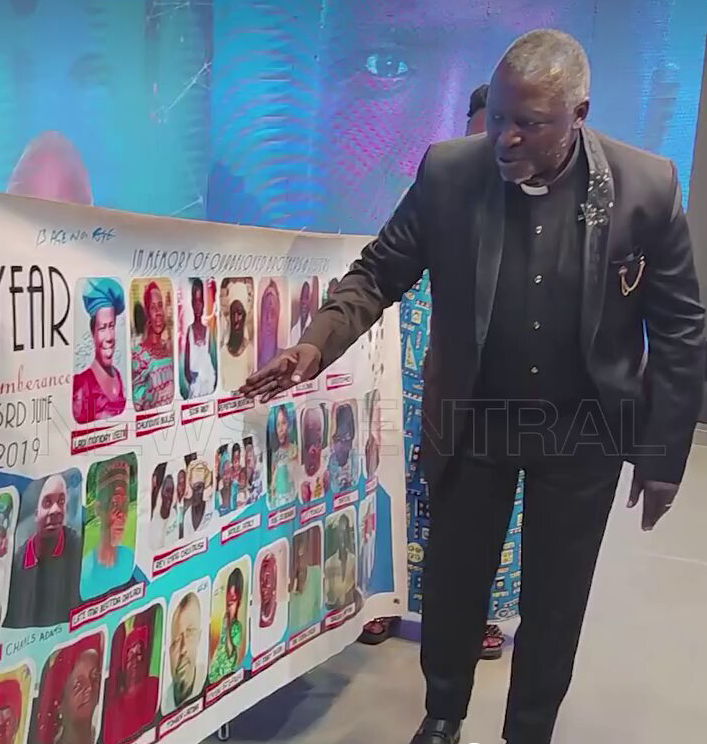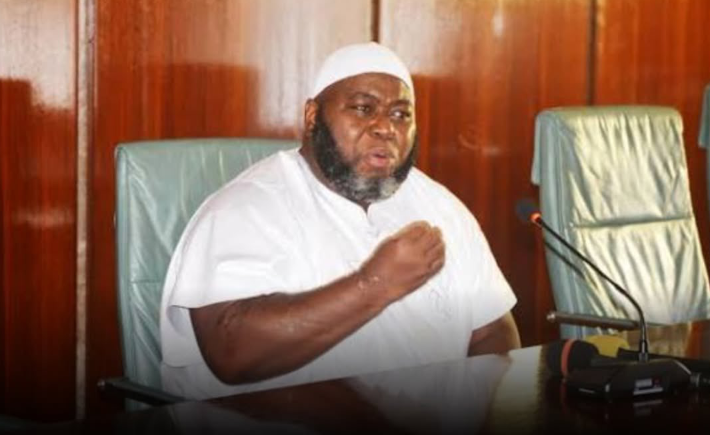
“Muslims Are Killing Muslims, Yet Blame Others” — Pastor Ezekiel Dachomo Sparks Reactions Over Fiery Remarks On Religious Division

Outspoken Nigerian cleric, Pastor Ezekiel Dachomo, has once again ignited heated discussions across social media after boldly claiming that many of the religious crises attributed to persecution are actually internal conflicts within Islam itself. In his latest sermon, which has since gone viral online, the pastor said, “If they say Muslims are being killed, by who? By Muslims. They are attacking each other based on their belief. They are divided.” His words have stirred waves of mixed reactions from Nigerians, drawing both criticism and applause for what some see as an unfiltered truth and others view as a divisive statement.
Pastor Dachomo, who is known for his fearless commentary on national and religious issues, went further to assert that Muslims in the South West region of Nigeria are more tolerant and less fanatical compared to their northern counterparts. According to him, while religion has long been a uniting force for many, in parts of the North it has also become a weapon of division and extremism. “The Muslims in the South West are not like the ones in the North,” he said. “They coexist peacefully with Christians, they allow freedom of worship, and they don’t force their beliefs on others. But in the North, you can see that they are killing themselves, attacking each other, even when they share the same faith.”
The pastor’s comments come at a time when Nigeria continues to grapple with religious and ethnic tensions, especially in the northern region where extremist groups like Boko Haram and ISWAP have wreaked havoc for over a decade. These groups, which claim to be fighting in the name of Islam, have killed thousands of Muslims and Christians alike, destroyed mosques and churches, and displaced millions of people. Pastor Dachomo’s statement appears to highlight this painful irony—that much of the violence often blamed on religious intolerance is in fact internal strife among those professing the same faith.
In his message, he emphasized that the real enemy is not a particular religion, but the spirit of division that has taken hold of many believers, regardless of their creed. “When people claim to fight for God but end up killing others who worship the same God differently, what does that say about their faith?” he asked rhetorically. “You say you are defending Islam, but you bomb a mosque because they don’t pray the same way as you. You say you are a Muslim, but you slit the throat of another Muslim for belonging to a different sect. Is that faith or fanaticism? It’s confusion. The devil is just laughing because he has made people enemies of themselves.”
The sermon, shared widely on TikTok, X (formerly Twitter), and Facebook, has since drawn thousands of comments. Some users hailed the pastor for speaking boldly about what many are afraid to say publicly. Others, however, accused him of generalizing and stereotyping Muslims, warning that such statements could fuel further division in a fragile country already struggling with religious coexistence.
A user on X wrote, “What Pastor Dachomo said is not a lie. Boko Haram and ISWAP are Muslims fighting Muslims. In the North, Sunni and Shiite clash all the time. He’s only pointing out the truth that many won’t admit.” Another, however, countered, “This is exactly how religious tension starts. A pastor has no right to define what Islam is or how Muslims practice it. He should preach peace and not division.”
Religious scholars and commentators have also weighed in on the debate. Some Islamic clerics have acknowledged that internal conflicts exist within Islam but caution that it is not unique to Muslims alone. “Every religion has internal divisions,” said Sheikh Abdulrasheed, an Islamic scholar based in Ilorin. “Look at the Christian denominations; there are disagreements too. So, while it’s true that extremist groups have caused problems, we must not generalize or label an entire region as fanatical.”
Others, however, see Pastor Dachomo’s remarks as a reflection of Nigeria’s complex religious landscape. In the South West, where Islam and Christianity have coexisted for centuries, interfaith tolerance is common. Families often have both Muslims and Christians, and religious festivities are celebrated side by side. This contrasts with parts of the North, where religious identity can sharply define social and political interactions. Many observers believe this difference in religious experience is what Pastor Dachomo was trying to highlight.
The pastor’s statement also touches on a broader national concern: the role of religion in Nigeria’s unity. Over the years, religion has been both a tool of peace and a weapon of war. From the Maitatsine riots in the 1980s to the ongoing insurgency in the North East, the country has witnessed how easily faith can be manipulated for violence. Pastor Dachomo’s blunt assessment seems to challenge Nigerians to confront this uncomfortable reality rather than continue blaming external enemies.
However, critics argue that his delivery, though passionate, lacked diplomacy. “A national pastor should be cautious with his words,” said one commentator. “Even if he’s right, the way he said it can make people defensive instead of reflective. You don’t correct with condemnation; you correct with compassion.”
Still, for many Nigerians, Pastor Dachomo’s words struck a chord because they resonate with what is visible across news headlines—Muslim clerics assassinated by rival sects, mosques bombed by extremists, and communities torn apart not by Christians versus Muslims, but by Muslim factions fighting over doctrinal differences. His remarks, though controversial, have opened another window into a conversation that many feel Nigeria must have honestly if true peace is to be achieved.
The pastor ended his sermon with a call for love and understanding among all believers. “Religion is supposed to make us better, not bitter,” he said. “When you start to hate because of your belief, then your belief has become a curse. God does not need you to kill for Him. He needs you to love for Him.”
As the dust continues to settle on his remarks, it’s clear that Pastor Ezekiel Dachomo has once again succeeded in sparking national reflection. Whether his tone was too harsh or simply truthful, his message touches a nerve that Nigeria has long struggled to confront—the misuse of religion as a shield for violence and intolerance. His words may have offended some, but for others, they are a painful mirror held up to the nation’s conscience.
In a country where faith shapes identity, politics, and even survival, his statement serves as both a warning and a challenge. Perhaps the real test lies not in whether Nigerians agree with him, but in whether they can rise above religious divisions to build a nation where no one needs to die in the name of the God they all claim to serve.
If they say Muslims are being k!ll£d, by who?...by Muslims….they are attack!ng each other based on their belief...they are divided..."
— Oyindamola🙄 (@dammiedammie35) November 11, 2025
- Pastor Ezekiel Dachomo says South West Muslims are less fanatical than those in the North and more tolerant of other religions. pic.twitter.com/SeyvfbyXh9


